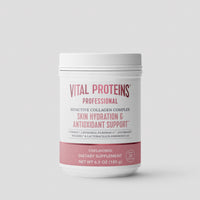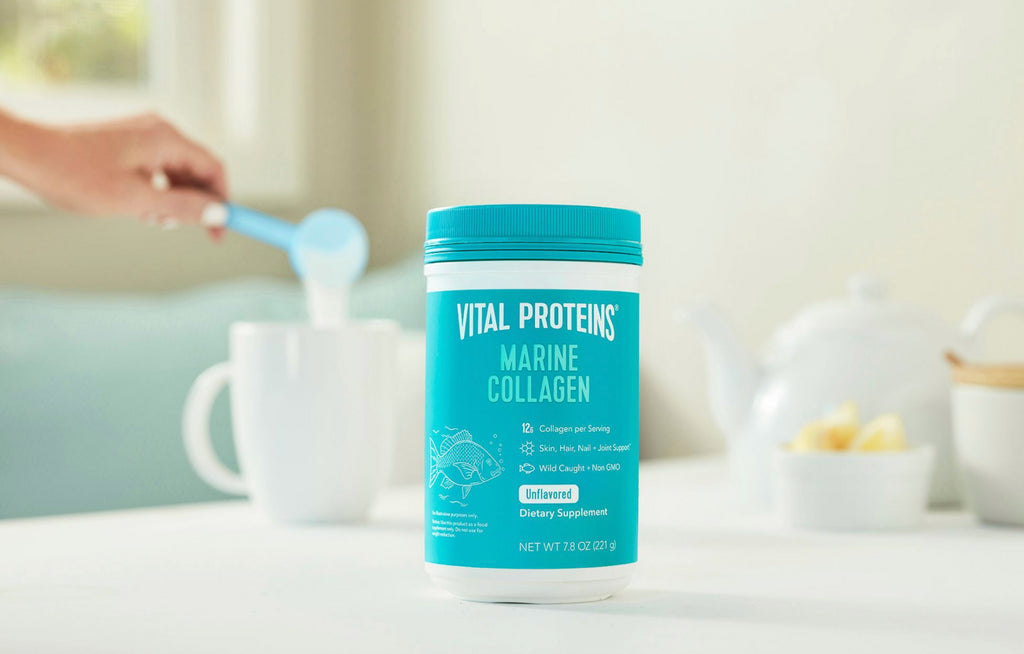When it comes to collagen, you have many options available to you! So when it comes to finding the "best one" for your routine, it can be helpful to start by understanding the benefits of each. In this case, we're specifically focusing on fish collagen (aka Marine Collagen). Below, we'll discuss what it is, how to take it and how it can work for you. Keep scrolling to get the scoop.
What Does Fish Collagen Do?
Fish collagen provides the same benefits as our Collagen Peptides and helps support hair, skin, nails and joints.** Around the age of 30, our bodies begin to produce less and less collagen, making this offering a good supplement to help up your collagen intake and boost your daily wellness regimen.**
Here are a few other ways it helps as well:
Fish Collagen for the Body**
Eating a healthy diet, getting plenty of exercise and including collagen — like fish collagen — in your diet are a few ways to help keep these important parts of our bodies well-oiled and strong.
Fish Collagen for Skin**
When our body's natural collagen production begins to decline, this may cause the appearance of fine lines and sagging skin. Collagen helps aging skin by keeping it firm, plump, hydrated and supple.
Fish Collagen for Joints**
Ligaments and tendons are a type of connective tissue that attaches two bones and muscles, holding them together. These tissues — bones, ligaments, tendons and the skeletal muscles — are made up of proteins, including collagen. Incorporating fish collagen into your diet can help keep these in working order.
Is Fish Collagen Better Than Beef Collagen?
There are many similarities, and some differences, between fish collagen and beef collagen. For starters, both easily dissolve in liquids, are unflavored and odorless, and boast the same types of collagen. Additionally, just like our bovine-based Collagen Peptides, our Marine Collagen is rich in types I & III collagen.
Ultimately, the main difference to note is fish collagen is pescatarian-friendly, while beef collagen is not. Beef collagen is sourced from pasture-raised bovine hide, while fish collagen comes from non-GMO, wild-caught white fish off the coast of Alaska. Once caught, the fish scales or skins are soaked, cleaned and softened to prep for collagen extraction. Purified water is then introduced to the process and heated to break these down into smaller protein chains called collagen peptides. Pressurized hot air is then used to hydrolyze these into a fine, odorless powder you get in your canister.
When Should I Take Fish Collagen?
As mentioned, our body’s natural collagen production begins to decline around the age of 25. Fish collagen is easily digested and absorbed by the body. So to continue to support healthy hair, skin, nails and joints,** 1-2 scoops a day is recommended to maximize these benefits.
To get an even more customized quote of how to take your fish collagen, we created our Collagen Calculator™. Answer a few unique-to-you prompts to get the scoop on the serving size that works best for you and your lifestyle!
What Form Of Fish Collagen Should I Take?
The type of fish collagen you take comes down to personal preference. Some people like to add fish collagen powder to their favorite beverages, foods or desserts. Adding 1-2 scoops to coffee is another popular way to enjoy it!
However, you also have the option to take fish collagen capsules. These are a great route for those who prefer not to add collagen powder to their drinks or foods. Note: Our capsules are made of two ingredients: gelatin and water. There are no preservatives, additives or excipients in these capsules. Whichever route you go, both still aid in promoting healthy hair, skin, nails and joints.**
Does Collagen Cause Weight Gain?
Since fish collagen is a protein, it may promote a feeling of fullness. However, since we advise taking it as a food supplement only, we can't comment on it being a weight loss or weight reduction method. That said, we suggest discussing your health goals with your licensed healthcare professional. They can best provide you with the diagnosis and treatment of any medical condition and assist you as well in deciding whether a dietary supplement will be a helpful addition to your regimen.**
















